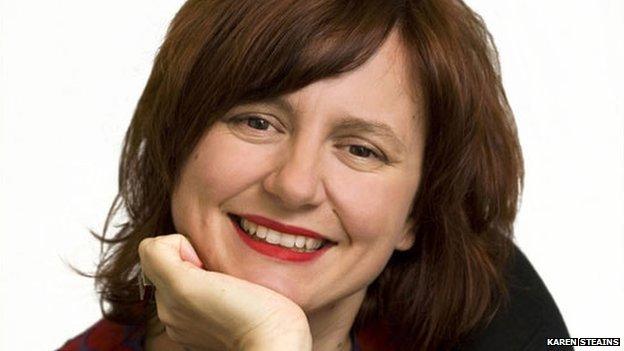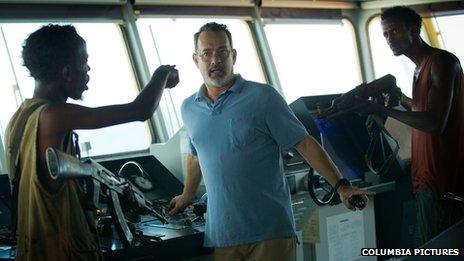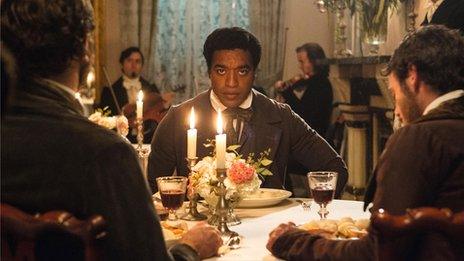London Film Festival: 10 questions for Clare Stewart
- Published

LFF boss Clare Stewart on her annual film consumption: "It used to be about 800 and now it's down to 500."
The BFI London Film Festival (LFF) opens later with sea piracy thriller Captain Phillips, starring Tom Hanks, directed by British film-maker Paul Greengrass.
The film is based on the true story of Captain Richard Phillips, who was taken hostage by Somali pirates in 2009.
The festival will close on 20 October with Saving Mr Banks, in which Hanks stars alongside Emma Thompson in the story of how the Disney classic Mary Poppins made it to the big screen.
Among the 234 fiction and documentary features over 10 days are screenings of Stephen Frears' Philomena, the true story of a woman's search for her lost son starring Dame Judi Dench and Steve Coogan, and Steve McQueen's 12 Years A Slave, starring Chiwetel Ejiofor, Michael Fassbender and Benedict Cumberbatch.
Other gala screenings include Alfonso Cuaron's space-set thriller Gravity, starring Sandra Bullock and George Clooney, Ralph Fiennes' The Invisible Woman, a period romance centring on the affair between Charles Dickens and actress Nelly Ternan, and the Coen Brothers' Inside Llewyn Davis, about the 1960s New York folk scene.
We spoke to the festival's director Clare Stewart, in charge for a second year, ahead of Wednesday's opening night.
The festival is about to start. Is this the calm before the storm?
[laughs] There are various elements of the storm along the way. There's the storm of the programme being locked down, there's the pre-production storm that we're in now, and there's the storm of the festival itself.
Was it important to you to have a British director opening the festival?
Having a British director for the first time since 2006 was a really exciting element, but it was the film itself that completely won me over and, of course, Paul Greengrass knows how to direct a fantastic thriller.

Captain Phillips, which stars Tom Hanks (centre), is based on a true story
Captain Phillips is much more complex than your average action film in that it's based on the true story of a 2009 hijacking of a US container ship by Somali pirates. It looks at two men caught up in something they are not in control of and it reflects on broader global economies and politics.
Tom Hanks book-ends the festival. How important is the Hollywood "A list" presence?
The LFF plays an increasingly important role in the awards season build-up for both the Baftas and Academy Awards.
Big films like Philomena, Gravity, 12 Years a Slave and Inside Llewyn Davis and Jason Reitman's Labor Day are definitely going to be featuring in awards season campaigns.
But they also open the festival out to a broader audience and help us to introduce other more surprising, discovery films to people who might be attracted in by these big films.
What did you learn from your debut experience in London last year?
We made a lot of change to last year's festival, we opened it up to a wider footprint across London, we introduced new programme sections, such as Thrill, Dare and Sonic, and we took a number of big screenings out across the UK.
That changed the landscape of the festival by opening it up for new audiences and if that hadn't worked I would have reassessed it. But we had a 13% increase in attendance and 33% of the people coming to the festival last year were first timers.
How has that influenced this year?
I felt for this year it was important to consolidate that, and let those changes really prove themselves.
You previously ran the Sydney Film Festival. Do audiences in London and Sydney differ?
I feel that one of the similarities is that there is an adventurousness and an openness to new things. One tangible difference is that here in London the connection to European films is much stronger, whereas obviously in Australia the Asian connection is much stronger.
Was there a particular film you had to go the extra mile for to get on your programme?
That's a festival director's best kept secret! A number of films are very fresh out of the edit suite and when that happens there's still a lot of thinking going on about release strategy around the world. I was really thrilled to be able to secure our closing night film Saving Mr Banks, which is a world premiere.

12 Years a Slave, which stars Chiwetel Ejiofor, is director Steve McQueen's follow-up to his acclaimed Hunger and Shame
The one that almost got away is 12 Years Slave. I'm so glad it's there - Steve McQueen's new film is in hot demand around the world and had only just finished in time for Toronto. I was pleased to secure the European premiere for London.
What do you say to those who say the LFF is in the shadow of Toronto and Venice film festivals?
I think not. Our timing means we have an important role in exposing the great films that have screened in other festivals in the course of the year but have not yet had exposure in the UK, alongside building the profile for films that are gearing up for Bafta and Academy campaigns.
We are becoming increasingly important as an entry to Europe for number of significant films. Both our opening and closing night films did not play in either Venice or Toronto.
You grew up in a small Australian town with no cinema. How much does that account for the fact you're now running one of the world's biggest film festivals?
My usual line is that I've been over-compensating ever since. The passion for movies took me by surprise in my teenage years when I moved to Melbourne to study at university and the journey has been an incredibly exciting one. On a daily basis, it does feel like I'm a long way from Korumburra.
How many films do you see in the course of year?
I surprised someone the other day when I said it used to be about 800 and now it's down to 500. I've got a great team of internal programme advisers here at London. I had to do a lot more personal viewing in Sydney than I do here.
But I loved that response because for most people 500 films is still a hell of a lot of films in one year.
The BFI London Film Festival runs from 9-20 October.
- Published7 October 2013
- Published4 September 2013
- Published5 September 2013
- Published8 August 2013